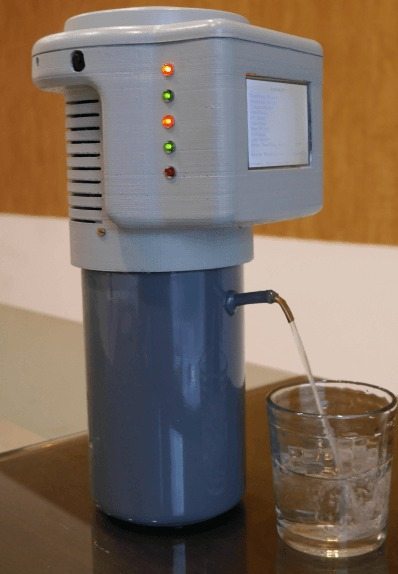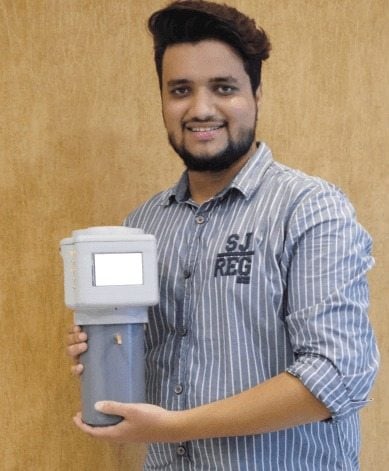Indian Engineering student Jawwad Patel’s self-filing water apparatus can produce potable water even from polluted air

Jawwad Patel
A few months ago, Jawwad Patel, an Engineering student from Hyderabad, visited Lattur — a village in neighbouring Maharashtra which was severely affected by the worst-ever drought this summer forcing thousands of people to flee. He talked to a woman in the village, who used to walk more than 12 kilometres to fetch just two-three litres of potable water for the consumption of her entire family.
And her story made him cry, literally.
“Being from a well-off family in Hyderabad with all amenities, I cannot even imagine a situation where I walk kilometres to fetch just a few litres of portable water. And things are no different in villages in Rajasthan, Bihar etc, where hundreds of people die in summer. The intensity of the situation is beyond our imagination,” Patel tells e27.
And he was determined to do something about this. He wanted people to create water on their own. So, he spent months on a project which he calls Project Dewdrop to develop a product that can extract water from the thin air and bring smiles to millions of people, not just in India but around the globe.

“I have developed a 3D-printed intuitive self-filing water apparatus that can produce potable water from air moisture. This apparatus can extract high-quality water even from polluted air,” he says.
See the video.
The product comprises a smart condenser, connected to an onboard computer and sensors. The apparatus has a fan that sucks the thin humid air from the atmosphere and transfers it to the smart condenser. It then converts the thin humid air to liquid water under the dome of a computerised sensor, with respect to the atmospheric parameters. The water thus produced gets passed through various semi-permeable membranes to wash out the dust and other unwanted things.
After the process, the water gets UV-treated which kills all the unnecessary microbiological activity and germs. The water then gets mineralised and finally stored in the tank attached to it.
“It can produce pure and healthy water even if the air is polluted. I have been using this water for the past 2-3 weeks and I’m still alive,” he quips.
The device cost him more than INR 12,000 (US$180) to develop. Once he starts commercial production, the cost can come down to just INR 2,000 (US$30), he adds.
The Engineering student is getting hundreds of calls from the US, UK, Malaysia, Switzerland, Saudi Arabia, Dubai, Oman, Russia and Qatar for his revolutionary product.
“While I have been getting hundreds of calls every day from people across the world, my first priority is the common man in my own country. I want to invent things that can solve the problems faced by the common Indian. I also have plans to make the youth aware of various innovative possibilities, especially the rural population about technology and the vast fields they can contribute in,” he says.
Patel has been an electronic freak since childhood. He started working on electronics when he was as young as 10 years. Later on, in schools and during his college period he won many competitions in electronics and robotics fields.
The 22-year-old, currently pursuing an Engineering in Electronics and Communication at Lords Institute of Engineering and Technology in Hyderabad, has set up a lab at his home to experiment with his ideas and dreams
This is not the first product Patel has developed. Last year, he was extensively covered by the Indian media for the invention of a smart helmet, which doubles as the only key to start the bike. You cannot start your bike unless and until you wear the helmet. This is aimed at reducing the fatal bike accidents in cities.

Patel with his invention
He also has quite a few other inventions to his credit, including a solar-powered vehicle and heartbeat-measuring wrist belt
Patel is now looking for an investor in India to fund the mass-production of the water apparatus. “I would like to get the apparatus introduced as part of ‘Make In India’ initiative. I will also take up entrepreneurship and launch a startup.”
The post No black magic, this student has invented an apparatus that can produce water from thin air appeared first on e27.